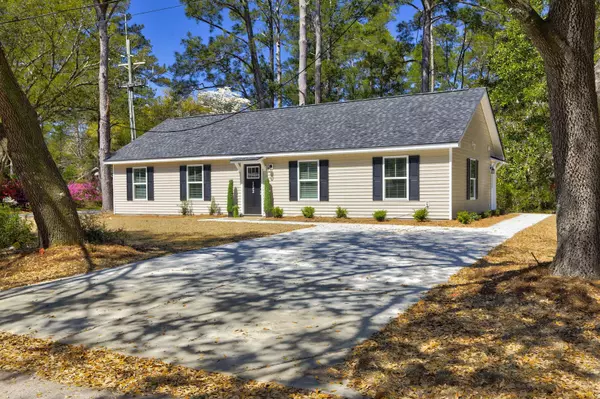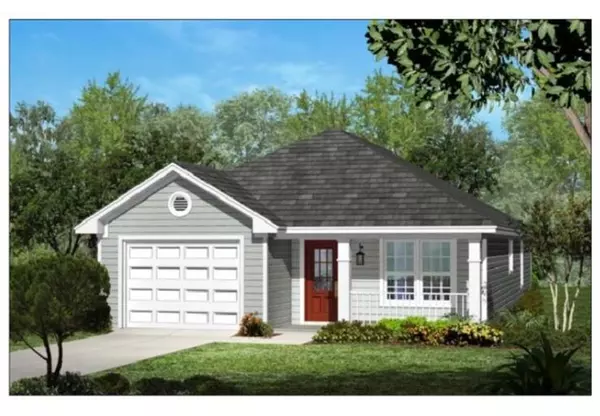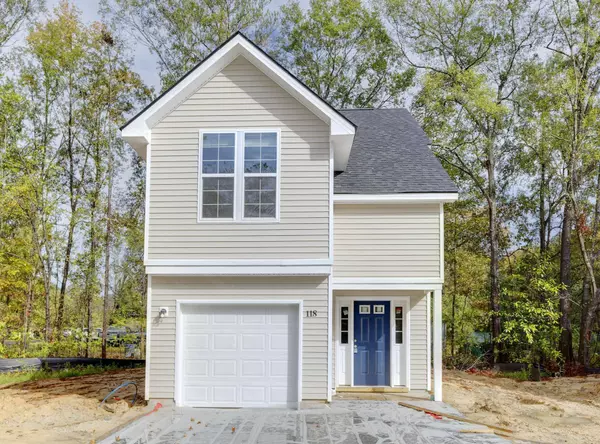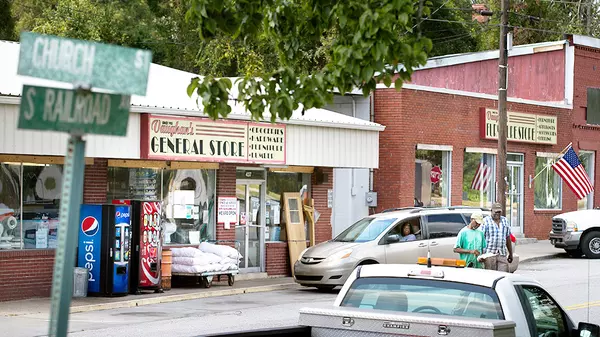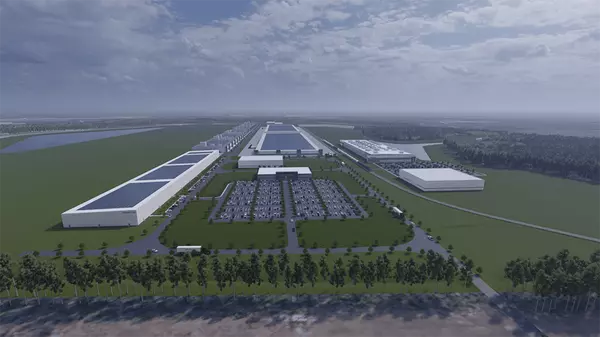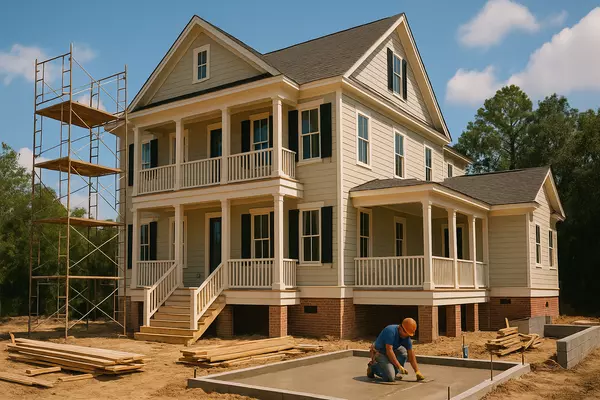Jobs in Ridgeville SC: New Opportunities for Homeowners and Investors
Ridgeville’s Jobs Boom – From Volvo to Redwood Materials
 Image: Rendering of Redwood Materials Recycling Plant in Ridgeville, SC via Redwood Website
Image: Rendering of Redwood Materials Recycling Plant in Ridgeville, SC via Redwood Website
Ridgeville, South Carolina may once have been a quiet rural exit along I-26, but today it’s buzzing with industrial growth. In recent years, a surge of major employers has transformed the local economy and put Ridgeville on the map. The anchor was Volvo Cars, which opened a manufacturing plant in 2018 – the company’s first U.S. factory. Volvo initially hired about 1,500 people and plans to grow to nearly 4,000 workers by 2030 as it adds new production lines.
Then came Walmart’s massive distribution center in 2022, a $220 million facility in Ridgeville Commerce Park now employing over 1,300 full-time workers (surpassing its initial 1,000 hires goal).
And most dramatically, Redwood Materials, a battery recycling and manufacturing startup founded by Tesla’s ex-CTO, announced a record-breaking $3.5 billion investment to build a 600-acre campus at Camp Hall Commerce Park in Ridgeville.
Redwood’s project – the largest economic development deal in South Carolina history – will create 1,500 new jobs over the next decade, cementing Ridgeville as a key node in America’s emerging EV “Battery Belt.” These three employers alone amount to roughly 4,000+ jobs flooding into the Ridgeville area, signaling sustained growth for years to come.
The presence of such high-profile companies is rapidly reshaping Ridgeville’s identity. Volvo’s automotive campus brought an entire supply chain and put Berkeley County (where the plant is located, just outside Ridgeville) among the fastest-growing areas in the nation. Redwood Materials’ arrival goes hand-in-hand with Volvo’s electric vehicle expansion – in fact, Redwood chose the Charleston region because of its proximity to companies like Volvo and a strong manufacturing workforce.
Officials note that Redwood’s investment will also spur significant improvements in infrastructure, from roads to schools and public safety, improving quality of life for residents. In short, what was once a rural stretch is now an emerging high-tech hub. For locals and newcomers alike, this jobs boom isn’t just about paychecks – it’s triggering a ripple effect in housing, community development, and overall economic vibrancy.
“Town Coming to Country”: Rapid Growth and Housing Demand
The influx of jobs has already translated into a spike in population and housing demand in greater Ridgeville. Berkeley County (which borders Ridgeville and hosts Camp Hall Commerce Park) was recently ranked the 17th-fastest-growing county in the entire U.S., with growth outpacing even its neighbors Charleston and Dorchester combined. What were once pine forests and quiet farmlands on the outskirts of Summerville are now bustling new-home communities and commercial centers.
Summerville, SC the nearest city to Ridgeville, has seen its population climb to over 51,000 as of 2023 with a median household income of $78,600 – a 6.6% jump in just one year. Not coincidentally, Summerville’s median home value rose about 7% to $295,700 in that time, reflecting the pressure of new demand.
Many families moving in for jobs at Walmart or Volvo have been snapping up homes in Summerville and beyond. Real estate agents predicted this back when Volvo was first announced: “After Volvo’s announcement…the demand for homes will rise in the area, which means the value of existing homes will likely rise, too,” one local agent said.
That’s exactly what has played out – a great demand with limited supply has put upward pressure on pricing, a welcome trend for existing homeowners watching their equity grow.

Crucially, the jobs boom is creating not just more buyers, but changing lifestyles. In 2015, a Summerville resident noted how people had moved out there “to be way out in the country away from everybody, but town is coming to country at this point”. That couldn’t be more true today.
Large master-planned communities have sprung up across the once-rural landscape to accommodate the influx of workers and their families. New highways and infrastructure were built to keep up – for example, a new interchange on I-26 (Exit 197 at Nexton) opened to improve access to these booming neighborhoods and the Volvo plant.
As a result, many employees who in the past might have faced long commutes into Charleston can now live minutes from work in communities designed around their needs. And Ridgeville's services and institutions are also expanding and growing to accomodate, as well. The average commute for Summerville residents has been about 30 minutes by car, but with major employment centers now located right in Ridgeville’s backyard, more locals can avoid the daily downtown drive. Instead, they’re enjoying modern suburban conveniences closer to home – a trend that has boosted demand for housing in Summerville, Ridgeville, and nearby areas even further.
Local officials expect these trends to continue as Redwood Materials ramps up hiring. Redwood broke ground in early 2024 and plans to start recycling operations by the end of the year. Over an eight-year period it will add those 1,500 jobs – many of them skilled positions with high wages – which will inject even more purchasing power into the housing market. The company is partnering with technical colleges on workforce training, and many of those future employees will be looking for homes in the region by 2025 and beyond.
Anticipating this, developers have prepared large tracts around Ridgeville for new housing. The Town of Ridgeville has considered annexations for mixed-use developments (like the proposed “Varn” and “Appleby” tracts) that would bring in single-family homes, townhomes, and neighborhood retail to serve the growing population.
Notably, these plans exclude apartments in favor of ownership housing, reflecting the community’s push for suburban-style growth. In short, Ridgeville is gearing up for a housing boom to match its job boom – and that creates exciting openings for both homebuyers and real estate investors.
Opportunities for Homebuyers: New Communities and Shorter Commutes
For homebuyers (especially those relocating for work), Ridgeville’s economic ascent offers a chance to get in on the ground floor of an up-and-coming market. Unlike some established areas where inventory is tight and prices sky-high, the Ridgeville/Summerville corridor is actively adding new homes to welcome incoming families.
Large master-planned communities like Nexton, Cane Bay Plantation, and Carnes Crossroads have been leading the charge. Nexton, for example, has quickly become one of South Carolina’s most celebrated new towns – in 2024 it sold its 3,000th home since opening in 2014 and was named the nation’s top master-planned community by the NAHB.
Nexton offers a mix of homes from the $300s to $1M+ (averaging around $500k) along with schools, parks, shopping and even high-tech office space. Crucially, Nexton is located within 15 miles of major employers like Volvo, Boeing, and newcomer Redwood Materials, making it an ideal landing spot for relocating professionals.
The development touts its “live-work-play” environment where someone can quickly assimilate into Lowcountry life while enjoying a short commute to work. For a Volvo or future Redwood employee, that could mean getting from your doorstep to the plant in 15–20 minutes, mostly avoiding interstate traffic. This convenience, combined with Nexton’s amenities, has made it a magnet for buyers coming from out of state to join the Ridgeville job boom.
Likewise, Cane Bay Plantation in Berkeley County has exploded in popularity. This enormous master-planned community (essentially a small town of its own) is permitted for over 15,000 homes and features its own schools, shopping centers, and recreation. Homes in Cane Bay and similar developments are selling at higher price points than the Charleston metro average – a testament to their desirability and the modern lifestyle they offer.
Even so, many buyers find they get more for their money here compared to closer-in suburbs. A new four-bedroom house in Summerville/Ridgeville often costs significantly less than a comparable home in Mt. Pleasant or downtown Charleston, for example, making it attractive to young families and first-time buyers working at these new employers.
And while the master-planned communities have been getting a tremendous amount of attention, the real story are the new and existing neighborhoods located in Ridgeville itself. These communities offer even more convenience to local employers while home buyers are getting in on the ground floor. Communities like Parker's Preserve for example are all new construction by Eastwood Homes offering 3-5 bedrooms, 2-3 bathrooms and up to 3,000 square feet of living space.
Affordability plus amenities is a winning formula. As the Greater Charleston New Homes Guide noted, communities like Nexton and Cane Bay not only offer proximity to all the new job centers, but also “home prices that are more affordable than many surrounding areas in Charleston and Dorchester counties.”
It’s easy to see why so many people are choosing to call Berkeley/Dorchester County home – they can have a brand-new house, enjoy pools, trails and top-rated schools, and be part of a vibrant growing area, all while building equity in a rising market.
For those already living locally, the surge in development is also positive. Longtime renters might finally take the plunge into homeownership with new subdivisions bringing more options. And existing homeowners in places like Summerville have watched values appreciate thanks to the increasing demand. The median household income gains in Summerville (boosted in part by higher-paying manufacturing and tech jobs) mean more residents are able to afford home purchases.
Programs to help first-time buyers are available, and some of the builders in these developments even offer incentives or closing cost assistance to attract the workforce from Volvo and Redwood. In short, if you’re looking to buy in the Ridgeville area, the timing is fortuitous – you’ll find a variety of new or recent homes, likely a shorter commute to work, and the promise that your investment will grow as the region continues to prosper.
Opportunities for Investors: Rentals and Rising Equity
It’s not just owner-occupants who stand to benefit – real estate investors are eyeing Ridgeville’s growth as a prime opportunity. A swelling workforce needs places to live, and not all the new hires will buy immediately. In fact, many Volvo and Walmart employees initially rented homes in Summerville when the plant and center opened. With 1,500 highly-skilled jobs on the way at Redwood Materials (many attracting talent from outside the area), the rental market is poised to see further strength.
Investors who purchase single-family homes or townhouses now can position themselves to provide housing for these relocating professionals. Rental demand is expected to remain robust – Charleston’s overall rental vacancy is relatively low (~8–9% region-wide), and in the Ridgeville/Summerville submarket it’s often even tighter due to fewer large apartment complexes. This means well-located rentals (like a 3-bedroom house in a family-friendly subdivision) can command attractive rents and lease quickly.
The return on investment outlook is promising. Not only can investors collect solid monthly rents, but property values are on an upward trajectory thanks to the job-driven demand. When Volvo chose Berkeley County for its plant, analysts predicted “the value of existing homes will likely rise” and a “much different market” would emerge, as “town is coming to country.” That proved true, and Redwood’s arrival simply doubles down on the trend.
An investor who buys in now could see both appreciation and steady cash flow as the area matures. It’s also a relatively stable, long-term play – Volvo and Redwood aren’t short-term projects; they represent multi-decade commitments to the region. Redwood’s campus, for example, is slated to expand in phases through 2030 and beyond, meaning the population and housing needs will continue rising gradually, not just spiking overnight. This kind of sustained growth can be healthier for investors than a sudden boom-and-bust.
There are also niche opportunities investors might consider. With more families moving in, there’s growing need for local services and retail – savvy investors might look at mixed-use or commercial properties (e.g. a small strip center or an office building for medical and professional services supporting the new communities).
On the residential side, flipping could be viable in older parts of Summerville or Ridgeville: renovating a dated home to resell into a market with lots of eager buyers. And let’s not forget land – those who purchased land in Ridgeville a few years ago have seen its value soar as developers seek parcels for new projects.
While land prices have jumped, some investors still pursue strategic land banking on the outskirts of the current development wave, betting that today’s fields might be tomorrow’s subdivisions once Redwood and its suppliers are fully operational.
Best Areas to Live (and Invest) Near Ridgeville
If you’re considering moving to Ridgeville for work – or investing in its real estate – it helps to know the lay of the land. Here are some of the hotspot communities and areas benefiting most from the jobs boom:
- Summerville (Dorchester County): The historic town of Summerville is the cultural and commercial heart of the area, with charming downtown shops as well as sprawling new subdivisions around its edges. Summerville offers a mix of established neighborhoods and brand-new developments on its northern side closer to Ridgeville. Many Volvo and Walmart employees have settled here for its balance of small-town feel and modern conveniences.
Commutes from Summerville to the Ridgeville industrial sites are roughly 20–30 minutes. Home prices range widely (roughly $300K–$500K for many single-family homes), and the town’s strong schools and sense of community continue to draw families. As a bonus, Summerville’s economy is doing well – unemployment is low and median incomes are rising – which bodes well for housing stability. - Nexton (Berkeley County): Located at the new Exit 197 on I-26, Nexton is a master-planned community built for modern living. It’s essentially an extension of Summerville into Berkeley County, but brand new and very forward-thinking (gigabit internet, walkable town center, etc.). Nexton’s location is extremely convenient to Volvo (via highway 27 or the interstate) and about 30 minutes to Charleston.
For incoming professionals, Nexton has apartments and townhomes for interim renting, and new single-family homes when they’re ready to buy. As noted, it’s within a quick drive of Volvo, Boeing in North Charleston, and Redwood’s future site. Properties in Nexton have been appreciating nicely due to high demand; investing in a home here could yield strong equity growth as the community continues to expand. - Cane Bay Plantation (Berkeley County): Further up US Hwy 176, Cane Bay is one of South Carolina’s largest master-planned developments. It’s popular with families, thanks to multiple on-site schools (elementary through high school) and extensive amenities like pools, lakes, and trails. Many military families (from nearby Joint Base Charleston) and Volvo employees call Cane Bay home. It’s about a 20-minute drive to the Volvo plant via back roads.
Given its sheer size (permitted for 15,000 homes), Cane Bay still has new construction phases opening, meaning opportunities to buy new. Investors have also had success with rentals here – a tidy 4-bed home in Cane Bay can attract a long line of tenant applicants, especially if they work at the new Walmart distribution center or in Summerville’s growing business parks. - Ridgeville & Vicinity (Dorchester County): The town proper of Ridgeville is small, but the areas around it are poised for growth. There are a few existing neighborhoods and rural homesites, but expect to see more development soon. The aforementioned Varn and Appleby tracts (if approved and built out) could introduce entirely new residential communities within the Ridgeville address. Living in Ridgeville offers the ultimate convenience to the job sites – Volvo and Camp Hall are just down the road.
It also retains a quiet, countryside atmosphere for now, which appeals to those who like space and privacy. Homebuyers seeking land or custom builds might find options here. And investors might look at Ridgeville for longer-term potential, snapping up land or older homes while prices are still relatively low, then benefiting as commercial activity and housing inevitably expand outward from the industrial parks. - Charleston Metro Fringe: A number of workers are also exploring nearby locales like Goose Creek or North Charleston (for those who want halfway between Ridgeville and the city), or even Walterboro to the west (more rural, very affordable). However, the sweet spot for balancing commute and lifestyle tends to be the Summerville-Ridgeville corridor and northern Berkeley County. These areas specifically target the workforce from the new projects, with marketing that highlights “easy access to Volvo” and even new roads built explicitly for that purpose.
As one example, Carnes Crossroads (at the junction of Hwy 17A and 176) is a growing community that offers new homes and is roughly equidistant from Ridgeville’s industrial hub and Goose Creek’s Navy base. Options abound, so buyers and investors have the flexibility to choose the community that best fits their needs – whether that’s a cutting-edge planned town like Nexton or a quieter suburban setting on the edge of the country.
The Bottom Line: A Housing Hotspot on the Rise
Ridgeville, SC is no longer just a dot on the map between Columbia and Charleston – it’s an emerging housing hotspot fueled by a boom in jobs and investment. The arrival of major employers like Volvo Cars, Redwood Materials, and Walmart has set into motion a virtuous cycle of economic growth, population influx, and property development.
For homebuyers, this means new opportunities to purchase in vibrant communities that didn’t even exist a decade ago, and to potentially enjoy significant home value appreciation as the region prospers. For investors, the combination of a growing renter pool, rising home values, and pro-growth development plans presents a compelling case to stake a claim in Ridgeville’s future.
What makes Ridgeville especially exciting is the sense of trajectory – the town and its surroundings are on a clear upward path. State and local leaders are fully behind the growth, touting South Carolina’s pro-business climate and investing in infrastructure to support it. Companies are committing for the long haul, and by extension so are the workers and families coming here.
It’s the kind of scenario where those who get in early stand to benefit the most, whether by securing a home at today’s prices or by investing in property ahead of the next wave of development. As always, real estate comes with no guarantees, but the fundamentals in Ridgeville – job creation, quality of life improvements, and housing demand – form a strong foundation.
In summary, buying in Ridgeville right now isn’t just a routine transaction; it’s buying into a growth story. The jobs boom is building more than just cars and batteries – it’s building communities. And those communities are creating new wealth and opportunities for anyone ready to make Ridgeville their home or their next investment success.
With thoughtful planning and a bit of vision, one might look back in a few years and say, “We bought in Ridgeville during the early days of the boom,” and that decision could very well turn out to be a rewarding one for years to come.
Categories
Recent Posts
